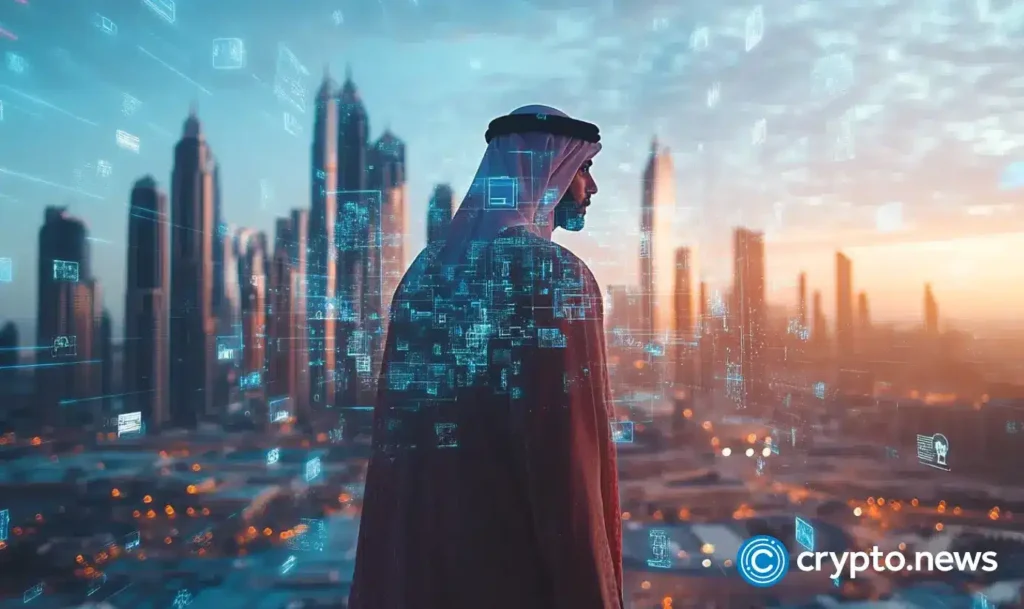Disclosure: The views and opinions expressed herein belong solely to the author and do not represent the views and opinions of crypto.news editorial.
The UAE has established itself as a global innovation hub, and video games are at the heart of its digital transformation. By 2023, the country’s gaming market reached a valuation of over $420 million, with a constant annual growth of 8.94%. This thriving market is supported by a passionate gaming culture: nine out of ten UAE adults identify as gamers and 23% of them spend more than 11 hours a week gaming. These numbers are unmatched in the MENA region and reflect an unprecedented appetite for gaming that the UAE is leveraging to build a blockchain-powered future.
As the gaming industry moves towards Web3, the UAE is taking bold steps to secure its leadership in this sector. We are all seeing a significant revival of blockchain gaming in 2024, with 4.4 million daily active wallets worldwide and $110 million in funding in the third quarter alone. By 2025, blockchain games are expected to contribute $1 billion to the UAE economy, making the country a vital player in the global Web3 games market, which is expected to reach $4 billion.
A rising star in web3 gaming
Recent studies place the UAE among the top 15 countries actively boosting the Web3 gaming sector, alongside China and Vietnam. This reflects the UAE’s aggressive push to integrate blockchain into gaming. The UAE sees Web3 as a strategic asset, a path to redefine how games are developed, played and monetized.
Last year, the Dubai Gaming Program 2023 announced a detailed roadmap designed to attract global players and local talent. The event involved major game studios like Ubisoft, which had previously established a regional development hub in Abu Dhabi. Similarly, projects like Sandbox have found a natural home in Dubai, where the regulatory environment actively encourages free-flowing developments rather than stifling them.
So there is strong support in the region from major studios integrating with Web3 games. Twenty years ago, we saw Silicon Valley become a pioneering hub for commercialized technologies, influencing hundreds of startups. The UAE is doing the same for the blockchain industry, more specifically for the Web3 gaming industry.
Building an ecosystem, not just a market
Although other regions like Southeast Asia and Europe have also adopted the blockchain gaming industry, the UAE has taken a head start in establishing comprehensive policies to attract new projects and integrate the industry into its digital economy. This isn’t necessarily about trying to establish a market for Web3 games; instead, it’s about building an ecosystem. The UAE wants to be seen as a focal point for all things Web3. This is evident through recent initiatives such as the DMCC Gaming Center in Dubai and the AD Gaming program in Abu Dhabi.
DMCC Gaming Center Dubai is a high-tech game development center that hosts over 100 gaming companies. The center provides easy access to comprehensive resources for these businesses, including financing opportunities, incubators, commercial space and highly skilled talent pools.
They are dynamic ecosystems that bring together developers, investors and thought leaders. Animoca Brands, a heavyweight in the blockchain gaming sector, has actively engaged in the Dubai ecosystem, further legitimizing its global aspirations.
Abu Dhabi’s AD Gaming initiative goes even further with a focus on sustainability. It’s about building a self-sustaining ecosystem that attracts and retains talent. Local startups benefit from mentorship, funding and access to a global network, while international developers find a welcoming environment to test and scale their projects.
AD Gaming has also partnered with Unity Technologies, the gaming engine behind every AAA title, to create a development program that will help AI, VR, and game development students gain industry experience.
NFT and venture capital: the winning web3 formula
The UAE’s Web3 gaming ambitions also extend to the realm of NFTs. The role of NFTs in the UAE’s Web3 strategy is not just a digital art or gaming asset: they are an integral part of creating immersive, player-driven economies.
This approach has made the country a magnet for global venture capital. Sequoia Capital, Andreessen Horowitz and other major players have invested heavily in UAE-based blockchain gaming projects, confident in the region’s potential to lead the industry.
Polygon, a blockchain scalability platform, is a great example of this synergy. Backed by funds based in the MENA region, Polygon has accelerated its development cycles, demonstrating how strategic investments from the UAE are pushing projects to launch more efficiently and on a larger scale.
The future is bright, but with challenges
Despite developments in this sector, the road ahead is not without obstacles. Scalability remains a crucial issue for blockchain gaming platforms. As the number of users increases, so does the demand for high-speed, low-cost transactions.
The UAE has a strong technological infrastructure and regulatory environment for blockchain projects, but it requires continued upgrades to manage this evolving space. But these challenges are not unique to the UAE. What sets it apart is its proactive approach to mitigation. The government’s clear regulatory framework provides stability, which is crucial in a sector subject to rapid change.
It is also important to note that the UAE’s ambitions extend beyond gaming. The country’s broader economic transformation aims to adopt blockchain technology comprehensively across all potential sectors. The lessons learned from building a Web3 gaming ecosystem will likely influence other industries, from finance to real estate. This cross-sector applicability makes the UAE’s investment in blockchain gaming a strategic decision with far-reaching implications.
Over the coming years, we expect to see more groundbreaking projects coming out of the UAE. Whether through local startups or global companies establishing a regional presence, the UAE’s influence in Web3 gaming will only grow.
The UAE’s Web3 gaming ambitions are bold. However, they are driven by strategy and supported by an ecosystem designed for success. From government initiatives to venture capital investments, every element of this ecosystem works in harmony to drive growth and innovation. The region’s ability to attract top talent, secure substantial investment and provide a stable regulatory environment has already positioned it as a leader in web3 gaming. Although challenges such as market scalability and volatility will always remain, the UAE government’s current proactive approach is actively addressing these obstacles with practical solutions.


